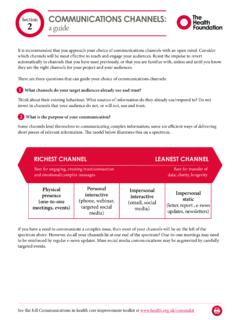Transcription of Complex adaptive systems - Health Foundation
1 Identify Innovate Demonstrate EncourageComplex adaptive systemsAugust 2010 Evidence scan: Health Foundation evidence scans provide information to help those involved in improving the quality of healthcare understand what research is available on particular scans provide a rapid collation of empirical research about a topic relevant to the Health Foundation 's work. Although all of the evidence is sourced and compiled systematically, they are not systematic reviews. They do not seek to summarise theoretical literature or to explore in any depth the concepts covered by the scan or those arising from evidence scan was prepared by The Evidence Centre on behalf of the Health Foundation . 2010 The Health FoundationPreviously published as Research scan: Complex adaptive systemsContentsKey messages 31. Scope 42. Concepts 63. Sectors outside of healthcare 104. Healthcare 135. Practical examples 186.
2 Usefulness and lessons learnt 24 References 28 Complex adaptive systems 3 This research scan collates more than 100 articles about Complex adaptive systems thinking in healthcare and other sectors. The purpose is to provide a synopsis of evidence to help inform discussions and to help identify if there is need for further research or development in this area. The key topic areas covered are: How has Complex adaptive systems thinking commonly been defined? How has this approach informed leadership and organisational development in various sectors? How has this approach been applied in the Health context? What practical initiatives use this approach? How useful is this way of thinking?The quantity and quality of research available is of evidenceRelevance to priorities across the UK Potential for use of this theory to have real patient and cost outcomesQuantity of evidence available overall Quality of evidence available overall Availability of other evidence summaries and guidelines The scan suggests that a Complex adaptive systems approach has something to offer when thinking about leadership and organisational development in healthcare, not least of which because it may challenge taken for granted assumptions and prompt people to think in a less linear fashion.
3 The most commonly suggested advantages of this approach are that it: challenges assumptions focuses on relationships rather than simple cause and effect models can be applied in a variety of contexts provides a framework for categorising and analysing knowledge and agents suggests new possibilities for change provides a more complete picture of forces affecting changeFrequently cited caveats include: not well defined or differentiated lack of empirical testing and use lack of comparison with other theories lack of predictive value used to justify a lack of may be a need for a clearer definition of this approach and how it applies to healthcare, comparisons with alternatives and empirical exploration of its value because most of the information available is descriptive rather than solid messagesComplex adaptive systems thinking is an approach that challenges simple cause and effect assumptions, and instead sees healthcare and other systems as a dynamic process.
4 One where the interactions and relationships of different components simultaneously affect and are shaped by the THE Health FOUNDATION1 ScopeThe scan provides a rapid collation of empirical research about Complex adaptive systems thinking. Although all of the evidence has been sourced and compiled systematically, it is not a systematic review and does not seek to summarise theoretical literature or to explore the concepts of Complex adaptive systems in any depth. PurposeThis research scan summarises readily available research studies about or using Complex adaptive systems thinking, with an emphasis on how Complex adaptive systems models have been used to inform leadership and organisational development approaches. The key topic areas covered are: How has Complex adaptive systems thinking commonly been defined? How has Complex adaptive systems thinking been used to inform leadership and organisational development in various sectors?
5 How have Complex adaptive systems approaches been applied in the Health context? What practical initiatives have used Complex adaptive systems approaches? How useful is Complex adaptive systems thinking?This section outlines the methods used to collate information. The following sections address each of the questions above briefly in MethodsTo collate evidence, one reviewer searched 10 bibliographic databases, reference lists of identified articles and reviews, and the websites of relevant agencies for information available as at July 2010. The search, analysis and narrative synthesis were completed over a three week databases incorporated material from many different disciplines and included MEDLINE, Ovid, Embase, ERIC, the Cochrane Library and Controlled Trials Register, PsychLit, HealthStar, Google Scholar, the WHO library, Health Management Information Consortium and Sigal. All databases were searched from inception until present.
6 Mesh terms and expanded key word searches were used based around the terms complexity, whole systems , adaptive leadership, working whole systems , and Complex adaptive be eligible for inclusion in the review, studies had to be: primary research or reviews published research readily available online, in print or from relevant organisations available in abstract, journal article, or full report form address one or more of the core in any language were eligible for inclusion. We scanned more than 50,000 pieces of research, selecting the highest quality and most relevant to summarise here. No formal quality weighting was undertaken within the review, apart from the selection process outlined above. More than 100 of the highest quality studies and descriptive overviews were adaptive systems 5 Data were extracted from all publications using a structured template and studies were grouped according to topic areas and outcomes to provide a narrative summary of key trends.
7 Meta-analysis was not appropriate given the context of the review and the heterogeneity of the material. No other detailed empirical reviews specifically on this topic were identified. When interpreting the findings it is important to bear in mind several caveats. First, the review is not exhaustive. It presents examples of studies and interventions but does not purport to represent every study about Complex adaptive systems thinking. Second, it is difficult to draw conclusions about the usefulness of this approach given the paucity of empirical research. Even where empirical studies were available, the level of detail was sometimes insufficient to provide a meaningful summary. There is a paucity of comparative evidence so it is difficult to say whether Complex adaptive systems thinking is more or less effective than , the empirical evidence did not usually focus on defining the approach and terms such as complexity theory and Complex adaptive systems were sometimes used interchangeably.
8 This means there is a lack of specificity and consistency surrounding the material is important to remember that a lack of evidence does not indicate a lack of effect or that theories or interventions are ineffective, just that there may be few high quality studies available from which to draw conclusions. These caveats are all important when considering the synthesis of material THE Health FOUNDATION2 ConceptsThis section describes some of the ways that Complex adaptive systems thinking and similar concepts have been defined and the principles or characteristics of the Defining Complex adaptive systemsIn its most simple form, Complex adaptive systems is a way of thinking about and analysing things by recognising complexity, patterns and interrelationships rather than focusing on cause and effect. The term Complex adaptive systems is thought to have been coined in the 1980s at the interdisciplinary Santa Fe Institute, a New Mexico think tank.
9 However, this type of thinking has been around for some time. For instance, in the 19th century the Austrian School of Economics described how order in market systems is spontaneous (or emergent) and is not necessarily planned. In the 20th century the study of Complex phenomena was further applied to human economics, psychology, biology, cybernetics, anthropology and the natural sciences. Over the past decade or so, the concepts have started to be used more extensively in healthcare, education and the social ,2 Proponents of this way of thinking suggest that in the past researchers and planners have viewed things in linear teams with simple rules of cause and effect. Analysts saw the world, organisations or their subject of study like a machine and thought that if they took the machine apart and understood the components, then they would understand the whole. It was also assumed that if each part was made to work better, then the whole would also work better.
10 3 Some planners and analysts have suggested that many things remain unpredictable and need new styles of analysis, including the weather, ecosystems, immune systems and organisational and human behaviour. In the field of quantum physics, researchers found that the very smallest sub nuclear particles were behaving according to a different set of rules, not cause and effect. investigators from many different disciplines began to explore phenomena in similar ways and a new theory emerged known as complexity theory. Complexity theory is based on relationships, emerging patterns and iterations. It suggests that the universe is full of systems such as weather systems , immune systems and social systems , and that these systems are Complex and constantly adapting to their environment. Over the past decade or so, this way of thinking about systems has become known as the Complex adaptive systems most common definition of a Complex adaptive system , based on the work of John Holland, is a dynamic network of agents acting in parallel, constantly reacting to what the other agents are doing, which in turn influences behaviour and the network as a Control tends to be dispersed and decentralised and the overall behaviour of the system is the result of many decisions made constantly by individual Following work around neural networks, it is thought in a Complex adaptive system order emerges rather than being predetermined.










